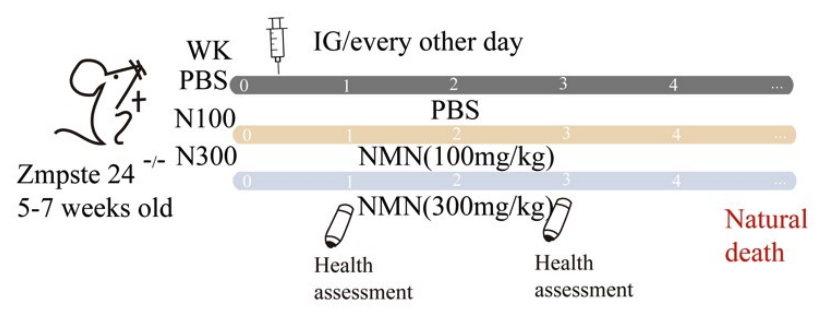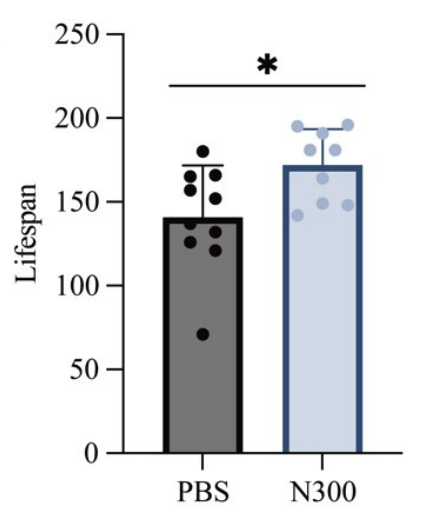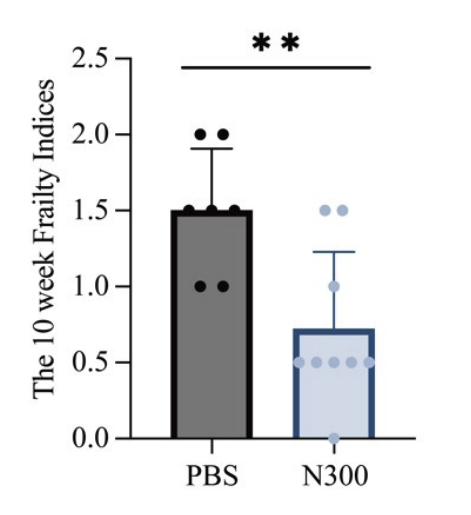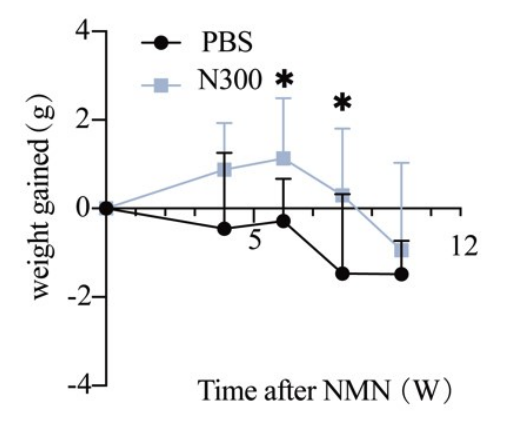A recent study investigated the effects of NMN supplementation on health and aging in mice.
“How to maintain the healthy ageing is the enduring focus of public concerns.”
Key Points:
The study highlighted several significant findings regarding NMN:
- Demonstrated benefits at a higher dose, equivalent to 24 mg/kg in humans
- Extended lifespan
- Reduced frailty
- Enhanced weight gain
Study Evaluated NMN in Fast-Aging Mice
The Zmpste24-/- mouse model of premature (fast) aging was used in this study.
“The Zmpste24-/- mice were often used as a model for assessing lifespan.”
The mice were divided into three groups:
- Control group: received a control solution (PBS)
- N100 group: received NMN (100 mg/kg)
- N300 group: received NMN (300 mg/kg)
Mice were given their treatments every other day through oral administration using a feeding tube.
Body weight and frailty were measured every 2 weeks until the mice died naturally.

Experimental design. Fast-aged mice were either given a control solution (PBS, gray line), 100 mg/kg NMN (N100, beige line), or 300 mg/kg NMN (N300, blue bar) until their natural death. Health assessments were taken every two weeks.
Higher Dose of NMN Was Beneficial
Mice were given NMN at 100 mg/kg and 300 mg/kg to see if it affected aging (lifespan, weight, frailty). In human terms, this translates to roughly 8 mg/kg and 24 mg/kg, respectively.
Results showed only the 300 mg/kg dose was effective, with no significant differences observed with the 100 mg/kg dose.
A previous study showed that oral administration of NMN (300 mg/kg) in mice increased plasma NMN levels in just 2.5 minutes. Using labeled NMN, they confirmed it led to increased NAD+ in the liver and muscle 30 minutes after oral administration.
Mice Given NMN Lived Longer
Fast-aging mice that received NMN at 300 mg/kg lived longer compared to those that did not receive NMN.

In this graph, mice that were given NMN (blue bar) lived more days compared to those that did not receive NMN (gray bar).
Treatment with NMN also extended the point where half of the mice in the group were still alive (median lifespan).
“The median lifespan of the mice increased from 21.4 weeks to 25.7 weeks, representing an increase of more than 20%.”
Frailty Was Reduced in NMN-Treated Mice
Treatment with NMN also reduced frailty in fast-aged mice.

This figure shows the extent of frailty at 10 weeks was significantly lower in mice treated with NMN (blue bar) compared to mice that did not receive NMN (gray bar)
“Frailty Indices reflected that N300 made the overall health of Zmpste24-/- mice better than that of the PBS group.”
NMN Enhanced Weight Gain
Supplementation with NMN protected fast-aging mice from the problems they typically face, like gaining weight too slowly and not getting enough nutrients.

This graph illustrates the weight changes over a span of 10 weeks. Mice that received NMN (blue line) exhibited notably higher weight gain during weeks 6 and 8 compared to the control group (black bar).
“NMN effectively increased body weight while maintaining overall health.”
Conclusion
Supplementation with NMN (300 mg/kg) extended lifespan, reduced frailty, and improved weight gain in fast-aged mice.
“We showed that NMN consistently extended the healthy and median lifespan of Zmpste24-/- and improved the Zmpste24-/- ageing phenotype.”
